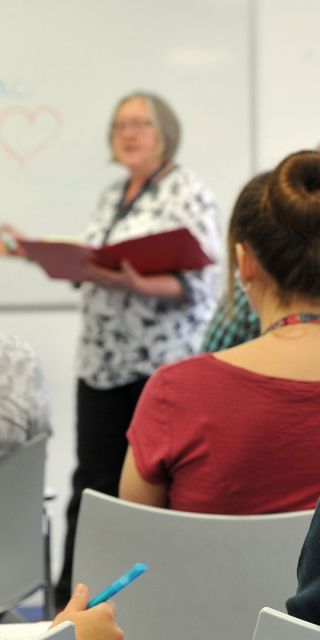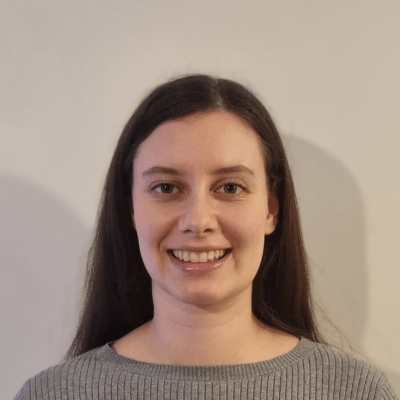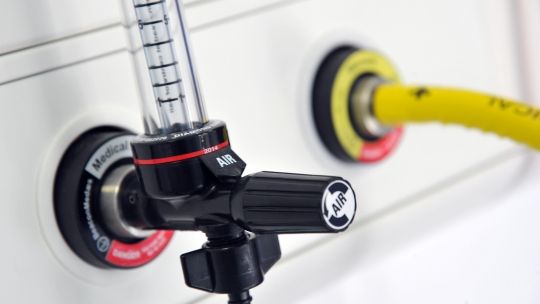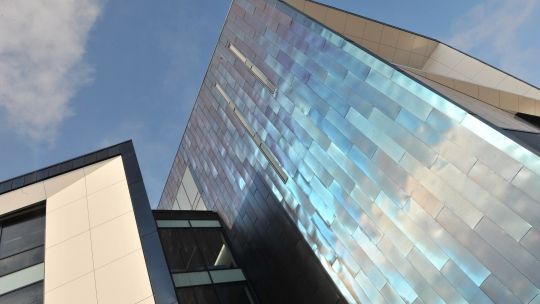
MSc Physician Associate
- Study Mode: Full Time
- Location: High Wycombe
- Duration: Two Years
- Start Date: September 2024
If you have a scientific background and enjoy being with patients, a role working in the healthcare profession as a Physician Associate can be both inspiring and rewarding.
The MSc Physician Associate programme is in alignment to Physician Associate Curriculum Framework to ensure that you succeed in the National Examination and can work as a physician associate in healthcare.
Why study at Buckinghamshire New University?
At BNU, we have great links with several partners within the local community such as Buckinghamshire Healthcare NHS Trust, so you’ll add exceptional work experience to your CV. The programme has a strong employability focus, working with the trust to solve local skill needs and enable you to become an effective Physician Associate for the rest of your career. Should you wish to stay local and work in Buckinghamshire, your experience will put you in a prime position to continue your role after university.
BNU has a number of well-established partnerships with other health organisations in South-East England too, including Oxford University Hospitals NHS Foundation Trust to enhance your experience and promote practice based learning. Therefore, you will be equipped with experience and expertise that will give you an excellent start to your career as a Physician Associate. In addition to our close links with local and regional trusts and organisations, we are in an ideal location close to London which makes commuting to your course easy and stress free, with a variety on online resources too.
We also won a prestigious and coveted award for our response to the cost-of-living crisis. The 2023 Whatuni Student Choice Awards (WUSCA), is the leading higher education award based solely on student choice, recognising our sector-leading partnership work and Bucks Students’ Union in alleviating the cost-of-living crisis facing students. Our focus is on helping you achieve your dreams no matter your background or economic circumstances.
What will I study?
Our experienced lecturers will prepare you with all the skills you need to provide care and treatment to patients. You will learn to carry out a range of medical activities such as physical examinations, medical histories, diagnostic and therapeutic procedures. The programme draws on broad science principles whereby anatomical and patho-physiological processes are incorporated into a healthcare practice context. This course was designed in partnership with trusts and placement organisations and we aim to provide all the required skills and knowledge to succeed in placement and in the world of work afterwards. We encourage you to identify and study subjects you would like to understand as well as our core programme, as our objective is to support you in your career goals.
Over the course of the programme, you will undertake a minimum of 1,600 hours of clinical practice (up to 200 hours of simulation) in order to achieve competency framework requirements. Practice will cover a variety of clinical placements, such as General Practice, Acute Medicine, Accident and Emergency, Obstetrics and Gynaecology, Paediatrics, Mental Health, Surgery and an opportunity to undertake an elective placement in areas such as: Cardiology, Gastroenterology, Dermatology, Neurology and more.
During clinical placements, you will work on average an 8 hour day and across the 24 hour period to include, where appropriate, weekends and night duty since this exposes you to different medical challenges and to different working systems. Whilst in the clinical setting you will be able to apply learning to real patients/clients under the direct supervision of their clinical supervisor. University time is designed to support your work in placement, applying theory to placement, understanding the latest sciences, research and methodology and seeing your new skills work positively for you before your eyes.
The university has a wide range of resources available to students, and the location of the university is a huge bonus. Classes are detailed and taught well and being out on placement has really grown my confidence. I would recommend the course to others because of the great partnerships with health organisations, and other physician associates sharing their experience with us was really helpful.Jui Patel

What facilities can I use?
We have invested in state-of-the-art, simulated clinical skills areas. You will regularly spend time in these areas, to practise technical skills and use the newest technologies in a safe and supportive environment. In addition, as a student of BNU you will gain access to our gym, personal training sessions, physiotherapy and sports therapy clinic as well as our student union at a heavily discounted price. If you were thinking of doing something extracurricular, why not make use of our sports hall and live music events? All events, activities and societies are free of charge and you can find a range of interests no matter your age, fitness levels or preferences.
Why study this subject?
As a Physician Associate (PA) you will support doctors in the diagnosis and management of patients, this might be in a hospital or a GP surgery. You will be part of a growing profession in the NHS where vacancies currently exceed the supply of skilled professionals. Physician associates work under the direct supervision of a doctor and carry out many similar tasks, including the examination, diagnosis, management and care of patients.
You could be doing consultations, carry out physical examinations, do a range of diagnosis related tasks, help deliver treatment plans, do home visits and a range of other tasks. It is a varied and developing role with many different specialisms and tasks for you to experience.
By the time you complete the course, you will have learnt how to request and interpret test results, diagnose illness and develop treatment and management plans. All vital skills that will enable you to become an effective Physician Associate.
How will I be taught and assessed?
Taught lectures and seminars are led by industry specialists, with the aim of creating an ambience where you can express yourself in any form and understand the nature of working in the industry.
A range of learning and teaching methods are utilised. You will learn through:
- lectures
- seminar
- workshop
- group work
- tutored classroom sessions
- independent learning through individual learning plans
- case studies (skills and simulations)
- presentation
- problem-based learning.
You will be assessed using a variety of methods such as single based answer (SBA), OSCE and case study.
I recommend my course at Buckinghamshire New University for its exceptional teaching staff who bring expertise and industry experience into the classroom. The university fosters a sense of community among students and faculty, creating a welcoming and inclusive environment for everyone. BNU offers a unique blend of academic excellence and personalized support that sets it apart from other universities.Cresilda Marcelo
What are the course entry requirements?
Achievement of a first degree, minimum of a 2:1, in a life science, e.g. Biology, Biochemistry, Biomedical Science, Medical Science, Nursing, Physiotherapy or equivalent qualification or health-related subject from a UK university or an equivalent overseas qualification.
All applicants are expected to have recent academic study (within the last five years before the start date of the course you are applying for). If your degree was awarded more than five years ago, this will be considered on a case-by-case basis.
Advice on equivalent status of overseas awards will be obtained from the UK ENIC.
Have experience of working with people, preferably for example, in a health or social care context in the UK.
- A-level Chemistry Grade C or equivalent
- GCSE Maths and English Grade B or above
- Demonstrate proficiency in the English language, e.g. achieve an IELTS score of at least 7.5 in all sections or equivalent (in line with the General Medical Council requirements). This must have been awarded no more than two years before the start date of the course you are applying for.
Demonstrate appropriate personal qualities such as; motivation, good communication skills and understanding of the PA role during the selection process.
Shortlisted applicants will be invited to attend an interview.
A successful interview, satisfactory Disclosure and Barring Service (DBS) check and occupational health assessment will be required by all applicants prior to acceptance on the course. Candidates who fail the interview, DBS check and/or occupational health assessment will not be given entry onto the course.
The DBS in the United Kingdom does not currently conduct overseas criminal record checks. Therefore, International applicants, those without British Citizenship and British Citizens with a significant period of overseas residency require a criminal records check or certificate of good conduct from their home/overseas country prior to entry onto the course. A UK DBS check will be required after enrolment. Should the DBS and/or occupational health assessment be unsatisfactory the student will be referred to the Fitness-to-Practise panel.
Modules
This provides a guide of the modules that make up your course. You can find more information about how your course is structured on our Academic Advice section.
Year 1 Modules
General and Adult Medicine as a Physician Associate: Theory and Practice
Generating Knowledge
Year 2 Modules
Dissertation
Specialist and Acute Medicine as a Physician Associate: Theory and Practice
What are the tuition fees
Home
-
Home, Academic Year 2024 - 2025: £9,250 per year
International
-
Overseas/International, Academic Year 2024 - 2025: £17,000 per year
What are my career prospects?
Upon graduation you can progress to work as a Physician Associate in a range of clinical environments in Primary and Secondary care, including GP surgeries, hospital inpatient wards, and A & E departments. You can expect to work as part of a multidisciplinary healthcare team alongside doctors, GPs, physicians and surgeons. Most of your time will be spent working in hospitals or GP surgeries. Home visits may also be required.
Your varied clinical placements will prepare you for the working world and give you great employment opportunities after graduation. During placements, you will have the opportunity to work in the following areas: Accident and Emergency, General Practice, Mental Health and other clinical departments.
The relationships you will gain on your placements can sometimes lead to the offer of permanent employment on completion of your MSc. We recommend seeking employment opportunities with our partners, as they have identified the required skills and will often have need of you, however employers demand for graduates is high nationwide.
Course leader







